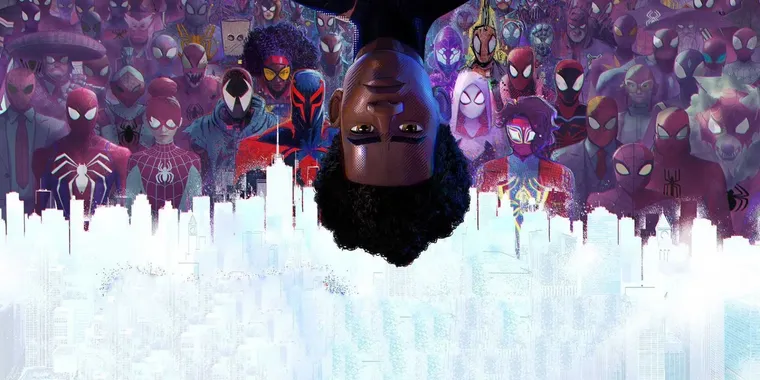You've been here before. A movie, a book, a pivotal episode of your favorite television series – whichever, take your pick, but I'll go with movie for now – is on, and it's presenting the hero with an awful choice. On the one hand, there's a single person; the hero's friend, partner (romantic or otherwise), a child, their mom. Anyone. They're in danger, the mortal kind, and saving them is within the hero's power. Only, it's not that simple. That other hand? That's holding a lot more people. A school, the city, the world, the whole multiverse, uncountable people at risk if the hero doesn't choose them over the smaller, more personal sacrifice before them.
There are as many resolutions to this hard choice of being a hero as there are setups, and not all of them are as dark and binary as they first appear. The film may go the way of forcing that choice to its worst conclusion, but it could just as easily present a third way out where – to quote that oft-British superhero who travels in a phone box – everybody lives. Maybe it comes at great personal cost to the hero themselves through injury or psychic trauma, or it could just allow everyone to ride happily into the sunset. Everyone has their take on the problem, their take on the solution, and what they think they're saying with it.
Most often, though, they share one bit of common DNA: whatever the outcome, being a hero means being separate, alone even, because only they can shoulder the burden normal people cannot. Even the loved ones they saved can't know who it was who was there for them. Their identity has to stay hidden, alienation is a part of the game. Maybe they have to break up with the partner they just saved to protect them, or they have to leave their life behind and walk a lonely road alone. Whatever, whichever road out of the impossible choice you take, that's the canonical end point of the heroic journey. Being a hero requires these moments, decisions that one way or another will leave them a bit further away from the human parts of their lives and push them further down the road of lonely defender.
What Across the Spider-Verse presupposes is... maybe it doesn't.
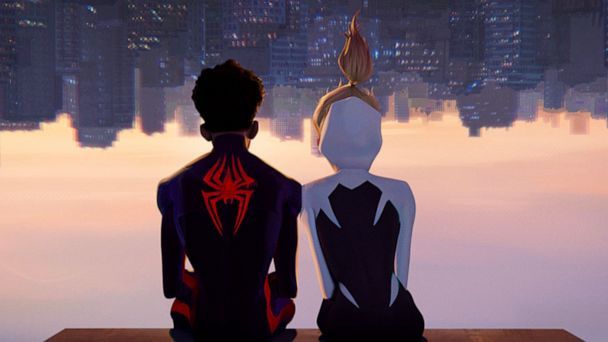
There are two stories happening in Across the Spider-Verse, both in their own ways a continuation of and expansion on the themes of its predecessor, Into the Spider-Verse. The first is textual, about Miles and his fight against the constricting expectations of the world around him. The other is more meta-textual, but not in the way that so many modern stories seem to understand the word "meta". Where most of its peers stop at the superficial point of observing the tropes that these stories are woven out of, or perhaps taking a stab at subverting a few, Across spends much of the film interrogating what the expectations of its genre are supposed to mean, and which (if any) are even necessary.
Specifically, Across the Spider-Verse is less about the tropes of the superhero genre, or even of the character of Spider-Man themselves, than the thing that binds those tropes as tightly as the world is trying to bind Miles: canon.
All superheroes – hell, any long-running character or world! – has an established canon that fans have circled around. Or, at least, fans usually want you to believe that there is one, single accepted canon. In truth, superhero canon is much like the cobbled-together canons of church scripture where, at multiple stops along the way, one group accepted this book or translation over another, and a second or third group made different choices. While it might feel like there's nothing more canonical than a Bible, what's actually in that Bible changes from demonimation to denomination. So it is with superheroes.
Still, Spider-Man does have some well-accepted canonical moments. Radioactive spider bite, Uncle Ben's death, With Great Power etc., Gwen Stacy's death, and Peter and Mary Jane's romance all count as about as firm a Spider-Man canon as you can put together. These moments are more than just pivotal moments in Peter's life, they're icons of what makes Spider-Man truly Spider-Man to many. To the point where, in almost every iteration of the character, audiences go from predicting when one of these Canon Events will occur to becoming impatient for them, all the way to legitimate rage at a take on Spider-Man rejecting the established story.
It's Miguel O'Hara, Spider-Man 2099, who serves as the metatextual crux of Across' approach. He's a continuity cop, a hawk watching out for when Canon Events are about to occur, ready to pounce on anything and anyone that might cause a Spider-Story to go its own way. A Lego Spider-Man is normal and A-OK, just so long as a police captain dies saving a kid.
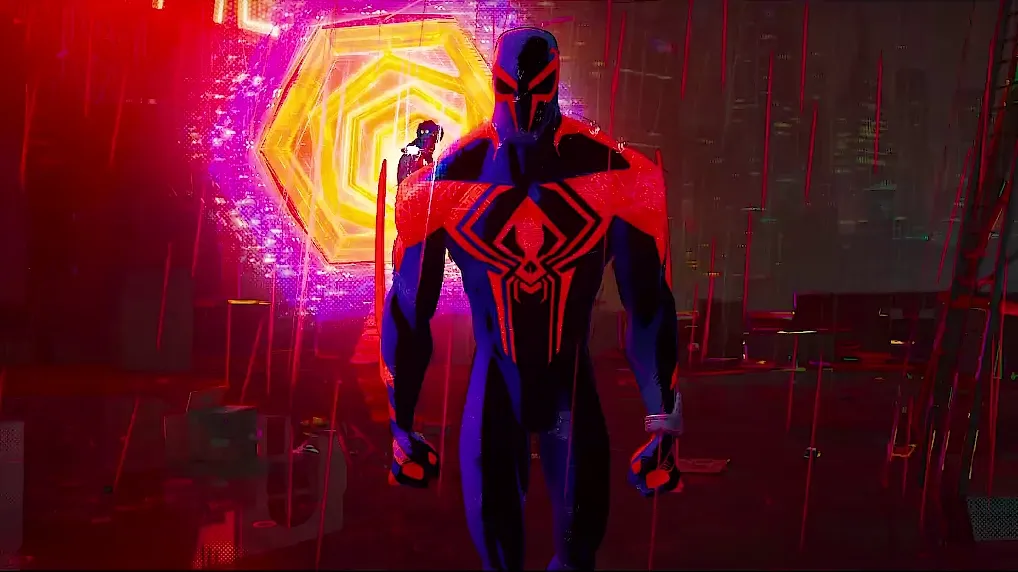
At the center of so many of these Canon Events are the hard choices I mentioned at the beginning. When Peter failed to make the hard, responsible choice to stop a criminal, Uncle Ben paid the price. When Captain Stacy saw debris from a building about to fall on a child, he made the hard choice to protect their body with his own, and paid the price. And so, as Miguel lays out the rules of the Spider-Verse as he sees them, as he speaks as the metatextual guardian of a web of infinite Spider-Folk, it's no accident that he frames allowing these tragedies to play out as a hard choice he and his Society have to not only accept, but enable.
To Miguel, Canon Events playing out as designed are the anchor-points that bind the Spider-Verse together. If a police captain doesn't die saving a child, if something stops that from happening, the absence of that event playing out in that way breaks a thread that could lead to the destruction of not just a single world, but the multiverse itself. Without canon, Miguel believes, there is no Spider-Man.
As it is for Miguel, so it also is for fandom. What makes a superhero a superhero is the canon. If things don't play out as the scriptures dictate they must, that character is no longer Actually That Character. When Superman is forced to snap Zod's neck to save a few people, it kicked off a wave of fury that's still out there in the digital ether, demanding that a Real Superman be brought back and arguably working as the corrosive acid that brought down the DCEU. The same goes for The Mandarin in Iron Man 3, where fan anger at the film's dismissal of canon led to the studio eventually retconning proper canon back into the universe. Time and time again, a take on a superhero leading to a novel choice has been met with a backlash demanding that a character must do a thing, or have a thing done to them, to be considered valid.
In this way, Canon Events became entirely about the thing itself than what those things actually mean. They create a foundation beneath the genre that demands certain tragedies, certain awful things, must happen and must play out as defined. More and more, too, these most-demanded Canon Events are explicitly those of terrible things. As soon as Jean Grey appeared in the first X-Men, the only thing fans wanted to see was the Dark Phoenix Saga, despite that character having a deep history that stretched over decades of comics. When Homecoming hit, the lack of reference to and primacy of Uncle Ben's death was called out as a critical weakness of the MCU's approach. You couldn't read an interview about Iron Man without running into a question about when "Demon in a Bottle" would finally make its filmed appearance.
This trend of Canon as Hard Choices creeps into the text of the story, into the roles that characters are expected to play. Miles can't tell his family about his identity because he has to Protect Them, to make the hard choice to isolate himself despite the pain. Captain Stacy has to arrest Spider-Woman even when it turns out to be his own daughter because he's a cop, and that's the Hard Choice you have to make. Peter and Gwen themselves have to lie to Miles on behalf of Canon, to deny this anomaly friendship so that tragedy can play out on behalf of the greater good.
What's the meaning of these Canon Events? Why do they need to play out? None of that matters in the face of checking the boxes. Lost in all of it is why the writers made these choices in those moments. The point of these big moments isn't the outcome, it's a list of things that add up to the shape of the thing people recognize. We need to make Hard Choices because what defines a hero is making Hard Choices. Not heroism itself, but identifying and choosing The Greater Good at all costs.
What Miguel, what fans, are defending is the status quo, no matter how awful that quo is. When you do that, when the status quo becomes your one overriding concern, is heroism even possible?
Of course not, Gwen finally realizes in the movie's final act. It's that realization that undermines the goals of Miguel's Spider-Society, and leads to the world beginning to cast off Canon, both thematically, and through its characters.
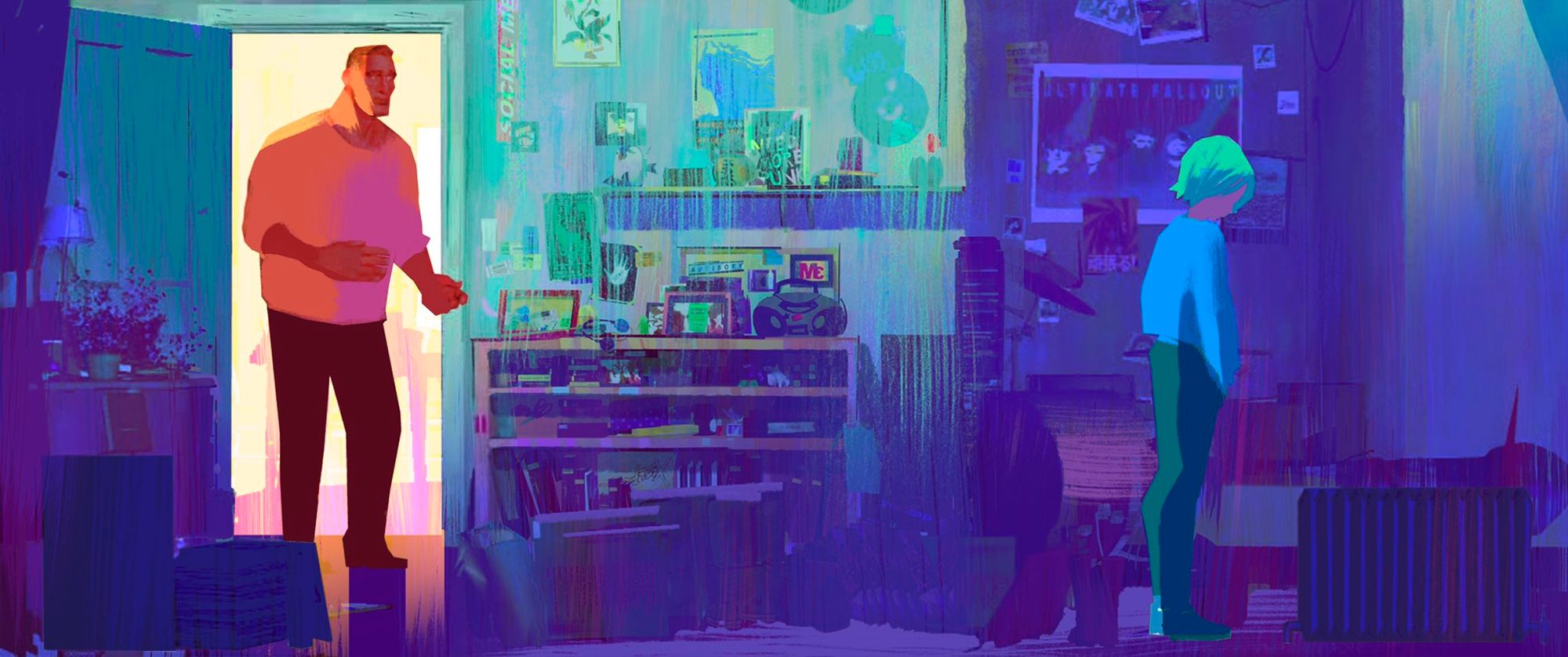
The opening of Across the Spider-Verse led to a moment of Captain George Stacy demanding the surrender of his daughter. Whatever good she was doing as Spider-Woman, whatever trust he had in his child that should have told him his crusade to arrest the vigilante is misguided, didn't matter. There is a thing a cop does, and that thing is to keep the order of things as it is. Arresting Spider-Woman was society's decision, and as an agent of society's punitive power, Captain Stacy had to act in that way. Arresting her was, essentially, canon for him.
We return to Gwen and Captain Stacy as we approach the end of the film, as Gwen enters her home expecting things to be exactly as she left them. In fact, for a moment, it feels like her father is saying just that: as a cop, he has to arrest her. There's no choice. No choice... so long as he's a cop. In that moment, Captain Stacy rejects the status quo, refuses the very idea of a hard choice between keeping order and betraying his belief in what his job is. Instead of either, he simply quits. If being a cop defined what was possible for him, and if those options worked against the meaning of why he did any of it in the first place, then resigning was the only way to do what mattered.
In those same moments, Miles has found his way to what he believes is home as well, and makes his own choice. In his search for the Spider-Society, Miles was looking for a proxy family where he could be both Miles and Spider-Man. But to the Spider-Society, being Miles, or Peter, or Gwen was secondary to their duty as Spider-Folk. The meaning of being Spider-Man was secondary to the iconography of it. Keeping to Canon is what made you a hero, not the ideals and emotions and love that made being a hero meaningful. You could be either a Spider-Man or Miles, but being both would collapse the universe.
Miles, like Captain Stacy, rejects this. Does, as he says, his own thing. If isolation and hard choices were the only choices the Spider-Society made available to themselves, then leaving was his only choice. And if a proxy family that defined itself based on Things and not Meaning was all that was out there, then it was his real family he'd choose. While revealing who he really was to his mother didn't go as expected, the goal was what mattered. Miles chose meaning over Canon, and saving his father had to be possible without the false choice Miguel demanded.
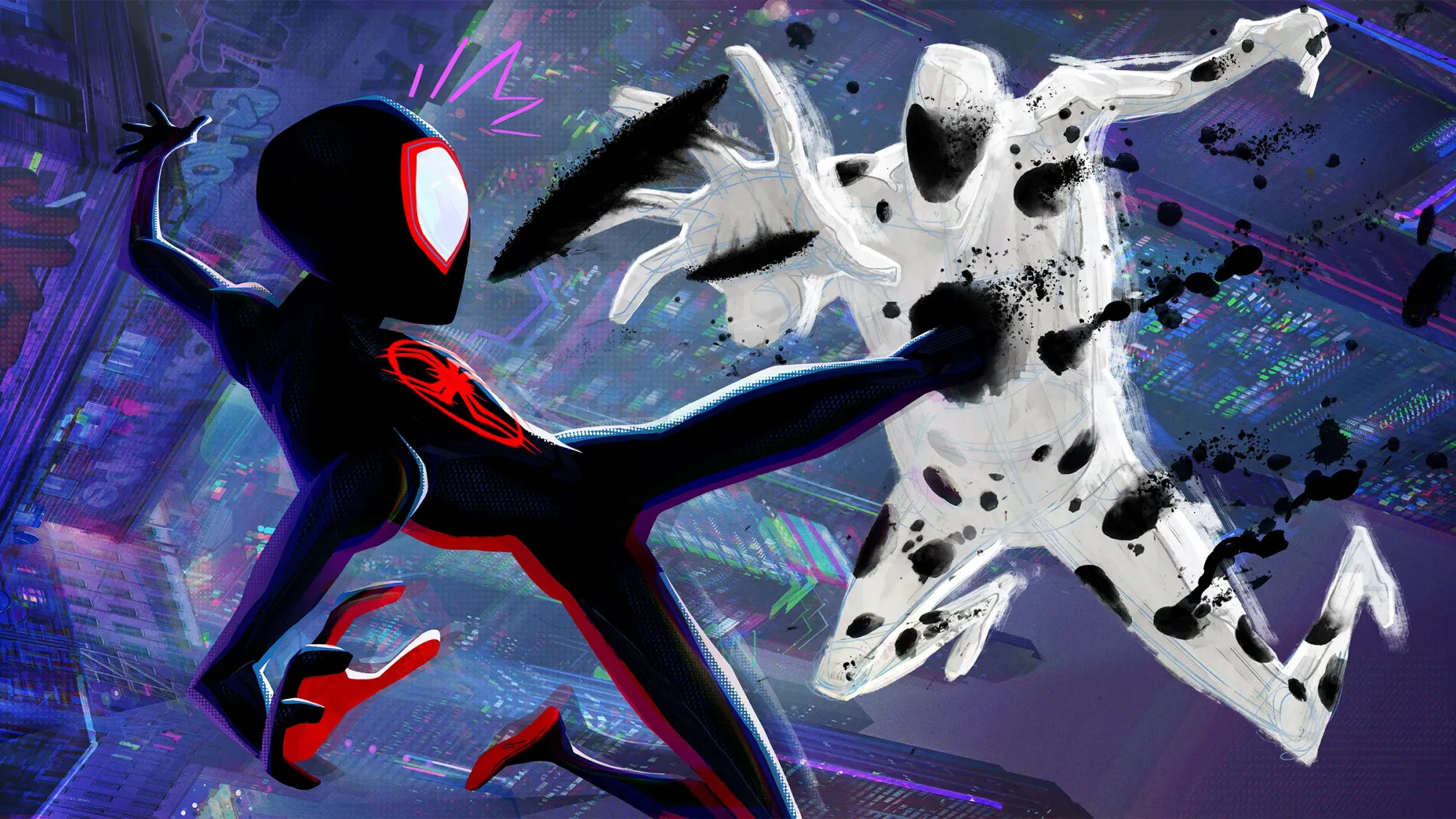
Across the Spider-Verse is, at its heart, about what defines us. Is it other people? Is it the expectations and demands of the groups we think we want to be a part of? Is it things, a checklist of actions you do or refuse to do that signify your identity?
No, the film argues, it's none of that. There's a meaning to being Spider-Man, a meaning to wearing the mask, and if you abandon that meaning to pursue the emptiness of Canon, then there is no point. Being a hero isn't about hard choices, but about having ideals and fighting for them. It may mean losses. Tragedies may come. But those tragedies are not what define heroism. Refusing to accept those tragedies as inevitable, though? Well, now you might be onto something.


